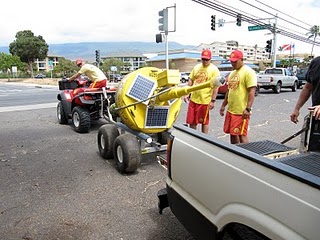Captain's Log
For a Healthy Planet
How to lessen sonar impact on whales
This article in the Honolulu Weekly includes a conversation with Robin Baird, who has done whale research in Hawaiian waters for eleven years. Robin helps explain the “lay of the land” in Hawaiian waters relevant to cetaceans and sonar, and outlines some steps the Navy could take to reduce impacts in their use of sonar. Robin also explains why we may not see whales who die or are injured by sonar use, making data collection on injuries more complicated than it already is.My personal opinion is that there has not been much emphasis on data collection. My observation is that most whales who strand themselves in Hawai’i are not evaluated for acoustic trauma. Without data, without the scientific method applied, we are in the dark.I am doing necessary post-whale season travel. I’m happy to report we were able to produce another season of bringing the live whale songs to the world, and to participate at a number of events, and to move our sustainability project, Haleakala Institute, forward. I’m sorry to report that we have depleted our financial resources. Our all-volunteer team greatly appreciates the heartfelt financial contributions that help keep our website, webcast, essential services alive. Thank you!
Whalesong Project Season 10 Complete

Aloha Everyone! Whalesong Project Season 10 of webcasting the live songs of Mauiʻs Koholā has come to an end. The whales are mostly gone now, and itʻs been about a week since I have heard any singing. The buoy lost its mooring this morning. Fortunately our diligent lifeguards at Kamaole I Beach called us and brought her safely to shore. They have been keeping a close eye on her for the last 9 seasons, since we moved to Kamaole I after completing our first season at Maʻalaea Bay. Here they are shown loading the buoy into our truck.
